March 2023
SETPOINT INTEGRATED SOLUTIONS CELEBRATES INTERNATIONAL WOMEN’S DAY AND WOMEN’S HISTORY MONTH

Setpoint Integrated Solutions wants to highlight its leading women by offering career aspirations for other women seeking a career in the industrial flow control industry. From being a daughter, friend, mother, wife, and employee, our list of women in leadership combined possesses over 130 years of professional experience. Mentoring others in the workplace is important to our organization. We hope you are inspired by the women who rose to leadership positions in their careers.
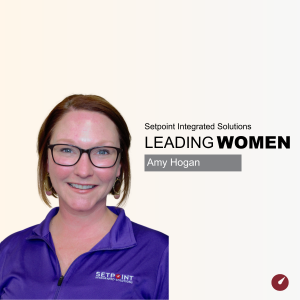
Amy Hogan, Continuous Improvement and Sustainability
Q: What are the biggest foreseeable challenges for women leaders?
A: We’ve come a long way in society over the years in a plethora of ways, but we have not fully combat all inequality in the workplace. Not just speaking for female/women leaders specifically. This includes being considered equally for opportunities of advancement, as well as salary, and being provided a dedicated leadership mentor or coach along the way. My advice: Be an advocate for you and your ideas! Do the due diligence on your own, gather proper data and also take chances – do not fear making decisions without solid known outcomes all the time because you may be your only cheerleader-rely on your work and love what you spend your time on; people are listening. Take the leaps that speak to you and you feel strongly about.
Q: How do you manage self-doubt?
A: Understanding that the actions I put forth are for the greater advancement of what I believe in and the organizational strategic initiatives. I continually remind myself that different genders and personalities bring structural and cultural differences into the conversation when at the table. I’ve instilled these strengths in my daughter as well-a sense of bold independence yet, self awareness. Not everyone will agree with you or your ideas, not everyone will be your supporter. Believe in you and always have fun with progress even when difficult. We should encourage this thought process in order to not get in the way of our successes. We all have a voice and a purpose. Go for things you feel strongly for and don’t be afraid to fail at times; it builds strength and further growth.
Q: What is your biggest indulgence at home?
A: My biggest indulgence at home is a long bath after yoga with quiet time alone. It’s where I meditate (and tune out but tune in to 🎶) and release the cares of the day.
Q: What are the main challenges that the next generation of female leaders need to be cognizant of?
A: How we choose to express ourselves will always be a challenge. Unconscious biases with growth into leadership (senior level or executive level mostly) is challenging as often times female leaders are seen as drivers but not always ideal motivators in all aspects. Direct approach from women is viewed very differently than that of most males, regardless of the recipient. Balancing respect in the workplace with likability can be a fine line for females with strong & direct personalities, as they may often be misinterpreted as unapproachable, harsh or not empathetic. Understand your audience, situation and the message you want to deliver.
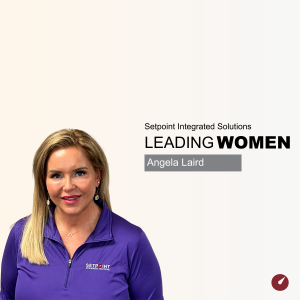
Angela Laid, Sales
Q: What energizes you about work?
I enjoy working with people and solving problems. When I think about how important our industry is to the sustainability of life, it invigorates me to do my part in helping our customers run as efficiently and safely as possible. Everything manufactured by the refining and chemical industry is used in our everyday lives and I can’t help but feel I get to play a little part in a much bigger picture.
Q: What’s the greatest risk you’ve taken as a professional?
Turning down a promotion. I was very young in my career, and it was brought to my attention that I wasn’t being made a fair offer by a senior leader of mine. It was scary to acknowledge that turning down the offer was in my best interest, but I knew I needed to be true to myself. I’m happy to say my offer was reconsidered and I did receive the promotion with a proper offer.
Q: How do you manage self-doubt?
Turn inward and focus on gratitude, positive experiences, and self-grounding.
Q: What is your biggest indulgence at home?
Bing-watching TV. I don’t sit still long enough to watch TV most of the time, however when I do decide to indulge it becomes an obsession until the show or series ends!
Q: What are the main challenges that the next generation of female leaders need to be cognizant of?
Owning your influence, Guiding Change, and Managing Stakeholders. Finding a communication style that works most effectively for you is key. Asking questions and learning from others who’ve made the transition will help greatly in honing these skills.
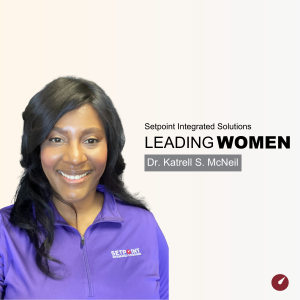
Dr. Katrell S. McNeil, DBA, Marketing
Q: As a leader in your business, how do you set the tone for the team?
I laugh. I aim to ensure that good vibes set the tone for my team. Working on many tasks and sometimes long hours may be necessary but fun if you are always in a good mood. Having a team with positive vibes and staying in a good mood creates a cohesive atmosphere. Many things that are out of our control and hard deadlines must be met; having an upward attitude that understands the bigger picture creates a greater understanding for everyone. Lastly, transparency and constructive communication are important to building trust. Most importantly, I appreciate that our company works hard and supports team building.
Q: Over the years, have you encountered any barriers to your success or growth as a female leader?
Understanding your passion, having family and friends, finding a great workplace, and knowing why you wake up daily are key to feeling like you have a purpose and also create barriers as each component is managed. Daily parenting demands and making time for self can easily create a mundane life. Time is another barrier; time happens so fast, and if you truly enjoy one thing, other things can fall to the wayside, then one day, you can become unsure if you are existing or doing what you love to do. Having a leader who understands your career goals and conducts bi-annual or annual check-ins is important. Your present job may have the career you want, but you and your leader may need to know your career goals.
Q: Was it always part of your plan to become a leader?
Yes, my high school had a leadership program that I enjoyed. I learned that being a leader is a service to others. It is also a way for you to understand other perspectives and help others be the best they can be. Being a leader is a responsibility, and it is also a personal brand. Supporting your team is important because being a good person is more important than having a leadership title.
Q: What advice would you give to women who want to be a mentor?
Only become a mentor if you can handle the responsibility and if time allows. Understand the mentee’s expectations. Becoming a mentor doesn’t mean becoming that mentee’s best friend, employer, or reference; knowing their expectations create transparency. My recommendation, keep it professional. I have also found myself getting to know someone in professional settings before becoming their mentor with infrequent networking and seeing where things organically go. It’s a mutual relationship.
Q: What is one lesson you learnt that’s unique to being a female leader?
Wear your heels. It is easy to blend into the industrial industry dress code – dark blue and steel-toe boots. Yes, I dress in the appropriate safety gear, but wearing pink safety shoes or heels to work, when not required, makes work fun and mixes things up. The industrial industry is great but often not seen as glamorous, yet it’s the greatest. It is like a big family.
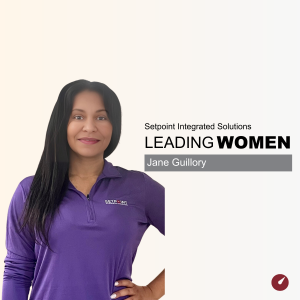
Jane Guillory, Supply Chain
Q: What personal sacrifices have you made throughout your career?
The most significant sacrifices I have made for my career center around in-person interaction with my daughter. I always wanted to be a mother and knew that providing my daughter with the life I hoped for would require making sacrifices along the way. I realized that if I were to grow in my career, it would need working late into the evenings, attending social events, and occasional weekends in the office. While I have reaped the benefits professionally, the moments missed while they are growing are never duplicated. Eventually, every first day of school, every lost tooth, every track meet, and every late-night study session helping with homework becomes a last. Unfortunately, this is a sacrifice many must make to continue growing and developing our careers.
Q: What leadership lesson you’ve learned that’s unique to being a female leader?
Having empathy creates excellent leadership. I think women generally have an advantage over men in this area. Empathy is a crucial skill as a leader because, with a good sense of it, you relate differently, you learn what inspires your team, you are better able to connect with collaborators, and it’s a foundational building block for creating trust. Empathy allows you to handle conflict better, deal with highly emotional or passionate circumstances, and redirect unproductive conversations.
Q: How do you unplug from work?
I unplug when spending time with my daughter, having a glass (or 3) of pinot noir, long walks, party planning, and creating.
Q: What’s the best work-related advice you’ve ever received?
Always do what is right, especially when it is hard. While it sounds so simple, there are times in all of our lives when doing the right thing is the most challenging thing to do. This has at times meant respectfully disagreeing with a manager or leader, I have missed opportunities that would have been wonderful at the time for my career, and I have upset people. With all of that, I can honestly say that every good and right decision I have made that felt tough at the time has turned out to be the best thing I could have done for those organizations and myself. The key to always doing the right thing is clearly understanding your role within the organization and the overall organizational goals and strategy so you appropriately represent the company and yourself as an individual.
Q: Do you recall any biases or assumptions made about you?
Yes! In male-dominated industries, there tend to be many conscious and unconscious biases. For example, being soft-spoken and kind equates to being a pushover; being respectful and allowing others to get their points across can mean you are unwilling to stand firm on your convictions; in some industries, it means being told: “you don’t know what you are doing you don’t know anything about trucks.” The one that seems to be the most prevalent is when women are viewed as bossy and overly aggressive for having strong opinions rather than being respected for being a leader and making difficult decisions.
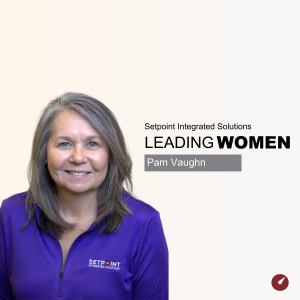
Pamela Vaughn, Sales
Q: Which woman inspires you the most?
The late Diana, Princess of Wales. Over the years I watched her transition through the spotlight with poise and grace. She loved being a mother and devoted herself to causes close to her heart. Even through life’s challenges she was open and honest.
“Carry out a random act of kindness, with no expectation of reward, safe in the knowledge that one day someone might do the same for you.” Princess Diana
Q: As a female leader, how do you set the tone of the team?
- Lead by example.
- Show respect.
- Communicate, but more importantly listen.
- Promote accountability.
Q: Was it always your desire to become a leader? Or did you stumble into this role along the way?
It was a little bit of both. Over the last 35+ years, I have been fortunate to work with some great leaders. It was through those experiences and connections that made me realize I wanted a leadership role.
Q: Why is being a mentor important to you?
It is important to invest in people and relationships. Sometimes we are mentors, and we do not even realize it.
Q: What’s your Favorite home indulgence?
My home indulgence is spending time with my family. Toys on the floor, playing games or watching a movie I cherish every moment.
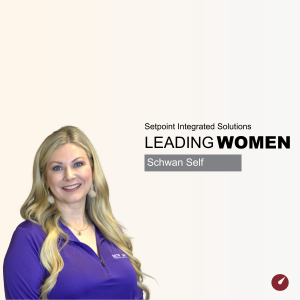
Schwan O. Self, PHR, SHRM-CP. Human Resources
Q: What is an experience that you’ve had that’s unique to a woman?
After working for a company for 5 years, I was told by a co-worker that the reason I got the job was due to the way I looked. Rather than let his comment offend me or cause me to doubt myself, I responded with, “Well, maybe that’s true, but I’m still here 5 years later because I proved that I was more than the way I looked”
We may not be able to control what others say about us but we can control how we respond to what is said.
Q: What are the biggest foreseeable challenges for women leaders?
One of the biggest challenges that I see for women in the workplace is not a new challenge, it is balancing work, home, and family responsibilities. Women are often responsible for most of the childcare, schooling, and household responsibilities, so we often struggle with those nagging internal feelings that we have to work much harder in everything we do. We want to make sure that everyone and everything gets 100% of the time and attention that is expected.
Q: If you could give just one leadership lesson you’ve learned over the years, what’d it be?
The best leadership lesson I have learned is that leadership is not about the leader. Leadership is about those that you lead. A good leader focuses on helping those around them grow into their full potential.
Q: What’s one piece of advice that greatly impacted you and your career trajectory?
One thing that I was told early on was the importance of building relationships with those that you support. His exact words were, “Don’t get so used to calling it HR that you forget what that stands for, it’s HUMAN resources, you have to make sure that you don’t forget the human side of what we do.”
Q: How have you developed your confidence as a leader?
I think the best way to build your confidence as a leader is to develop your own self-awareness. By creating your own self-awareness you become more humble, more teachable, and more approachable. You show vulnerability, which develops trust with others.
